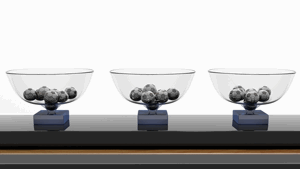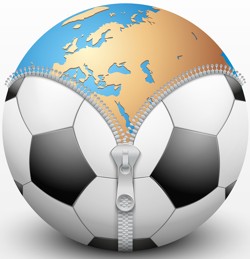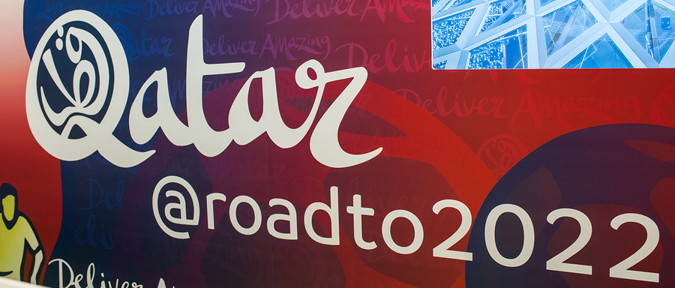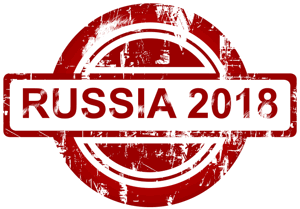World Cup Betting Offers 2026
 The World Cup is more than an International football competition, it is one of those rare global events that brings the planet together. Whatever peoples interest in football on a day to day basis we all tend to have an allegiance or an opinion when it comes who will win the so called ‘Greatest Show on Earth’. Many of us, whether we bet often or not, like to back our home or favourite team, or at least wager against our enemies.
The World Cup is more than an International football competition, it is one of those rare global events that brings the planet together. Whatever peoples interest in football on a day to day basis we all tend to have an allegiance or an opinion when it comes who will win the so called ‘Greatest Show on Earth’. Many of us, whether we bet often or not, like to back our home or favourite team, or at least wager against our enemies.
The World Cup only comes around once every four years and online bookmakers save up some of their very best free bet and enhanced odds offers to attract both new and loyal customers during the month long spectacle. Whether you are looking for a high value welcome offer or a good existing customer deal for regular betting throughout the World Cup then you have come to the right page. Below find our top free bets, new customer price boosts and the latest offers for all customers. Further down we’ve got the full schedule as well as World Cup odds, history, stats and key facts.
World Cup 2026 Betting Offers and Free Bets

Other World Cup Offers
This event has not started yet, please check back nearer the time. For other offers see our main loyalty page.
World Cup Format
Qualification
 The system of qualification for the World Cup involves what are in effect six smaller tournaments. In total 212 teams are eligible to enter qualification.
The system of qualification for the World Cup involves what are in effect six smaller tournaments. In total 212 teams are eligible to enter qualification.
Each continental zone, as defined by FIFA (Africa, Central & North America, Europe, South America and Oceania), are given several finals places depending on the coefficient measure of how strong the leagues and teams are from that area.
For 2026 this results in 16 slots for Europe, 9 or 10 for Africa, 8 or 9 for Asia, 6 or 7 for South America, 1 or 2 for Oceania, 3, 4 or 5 for North and Central America, plus USA, Canada and Mexico who qualify as hosts. The remaining two spots are decided by an inter-confederation play-offs.
To make things nice and confusing, just as FIFA like to do, each football confederation can decide on their own qualification format. Briefly this is how it goes:
- Africa (9 or 10 Places) – Format yet to be decided.
- Asia (8 or 9) – Two knockout phases result in 18 teams that are split into 3 groups of 6 teams. The winners and runners up go to the finals, third and fourth placed teams contest another round-robin group stage of 2 groups of 3. The winners of this qualify for the finals. The runners-up enter a play-off to find the eventual AFC representative at the inter-confederation play-offs.
- Central and North America (6, 7 or 8) – Two rounds take the 32 potential teams down to 12 that enter the third round. Those 12 teams are split into three groups of four, the winners proceed to the tournament while the best two runners up enter the inter-confederation play offs.
- Europe (16) – Teams are drawn into 12 groups consisting of four or five teams each. The group winners all qualify while the 12 runners-up entering a play off for the four remaining spots.
- Oceania (1 or 2) – Format yet to be decided, although, for the first time the region is guaranteed at least one berth.
- South America (6 or 7) – At last a simple one. Here we have one group of ten teams, the top six go to the finals and the seventh placed team gets an play off slot.
- Inter-Confederations Play Off (2) – The highest runner up from each confederation enter this play off, except for UEFA, plus one additional team from the host confederation – 6 teams total. A four game tournament is played, the winners go to the finals.
Tournament Matches
 Initially there was supposed to be 80 matches played between 48 teams at the 2026 World Cup finals, made up of 48 group games (16 groups of 3 teams) followed by 32 knockout matches. However, following the 2022 World Cup FIFA decided they wanted to preserve the four team group structure so all teams are guaranteed three games and it reduced potential collusion for knockout places.
Initially there was supposed to be 80 matches played between 48 teams at the 2026 World Cup finals, made up of 48 group games (16 groups of 3 teams) followed by 32 knockout matches. However, following the 2022 World Cup FIFA decided they wanted to preserve the four team group structure so all teams are guaranteed three games and it reduced potential collusion for knockout places.
The reversion to groups of four means we will now have 12 groups featuring six matches each, three for each team. That produced 72 group matches total plus 32 knockout games, as a new round of 32 has been added to the knockout phase. This is an increase of 40 matches compared to the 64 at the 2022 World Cup. As a result the tournament has expanded from 32 days to 39 days.
The 48 national sides are divided into 12 groups of 4 teams. The top 12 teams in the world (as defined by FIFA rankings) and the hosts are seeded into 12 different groups. The remaining teams are divided into geographically based pots and then drawn randomly to the rule that no group will have more than two European teams or more than one team from any other confederation.
Six games take place within each group with the winner and runner-up progressing to the last 32. That gives 24 places in the knockout stage, the remaining 8 places come from the best forming third placed teams in the group. Only 16 of the 48 teams are knocked out in the group stage, despite those 72 matches!
The previous tournament knock out rounds started at the last 16 stage, the round of 32 was added for the new expanded tournament. Each team can now play a maximum of 8 matches, which is one more than with previous editions. See further up this page for a full schedule of the tournament.
Previous World Cup Winners
| Host | Year | Final | Result |
|---|---|---|---|
| USA/Canada/Mexico | 2026 | ? | ? |
| Qatar | 2022 | Argentina v France | 3-3 (4-2 pens) |
| Russia | 2018 | France v Croatia | 4-2 |
| Brazil | 2014 | Germany v Argentina | 1-0 (aet) |
| South Africa | 2010 | Spain v Netherlands | 1-0 (aet) |
| Germany | 2006 | Italy v France | 1-1 (5-3 pens) |
| S Korea & Japan | 2002 | Brazil v Germany | 2-0 |
| France | 1998 | France v Brazil | 3-0 |
| U.S.A. | 1994 | Brazil v Italy | 0-0 (3-2 pens) |
| Italy | 1990 | W. Germany v Argentina | 1-0 |
| Mexico | 1986 | Argentina v W. Germany | 3-2 |
| Spain | 1982 | Italy v W. Germany | 3-1 |
| Argentina | 1978 | Argentina v Netherlands | 3-1 (aet) |
| W. Germany | 1974 | W. Germany v Netherlands | 2-1 |
| Mexico | 1970 | Brazil v Italy | 4-1 |
| England | 1966 | England v W. Germany | 4-2 (aet) |
| Chile | 1962 | Brazil v Czechoslovakia | 3-1 |
| Sweden | 1958 | Brazil v Sweden | 5-2 |
| Switzerland | 1954 | W. Germany v Hungary | 3-2 |
| Brazil | 1950 | Uruguay v Brazil | 2-1 |
| France | 1938 | Italy v Hungary | 4-2 |
| Italy | 1934 | Italy v Czechoslovakia | 2-1 (aet) |
| Uruguay | 1930 | Uruguay v Argentina | 4-2 |
Home Nations at the World Cup Finals
| Country | Finals | W | D | L | Highest Position | Goals F | Goals A |
|---|---|---|---|---|---|
| England | 16 (out of 22) | 32 | 22 | 20 | Winners – 1966 | 104 | 68 |
| Scotland | 8 | 4 | 7 | 12 | Group Stages | 25 | 41 |
| N. Ireland | 3 | 3 | 5 | 5 | Quarter Finals – 1958 | 13 | 23 |
| Wales | 2 | 1 | 4 | 3 | Quarter Finals – 1958 | 5 | 10 |
Tournament Stats
| Tournament | Team / Country | Player | |
|---|---|---|---|
| Goals Total | Most – 172 (2022) / Least – 70 (1930 & 1934) | 233 Scored (Brazil), 130 Conceded (Germany) | Miroslav Klose – 16 (Germany 2002-2014) |
| Goals Tournament | 5.38/Game (1954) | Hungary (27 – 1954) | Just Fontaine – 13 (France 1958) |
| Matches Played | 64 | Brazil (114) | Lionel Messi (Argentina 26 Matches) |
| Most Titles / Medals | – | Brazil (5) | Pelé – 3 (1958, 1962, 1970) |
History of the World Cup
The First World Cups
 The first World Cup game along quite late really when you think that international football competitions had been going for over half a century before the first tournament in 1930. England played their first international match against Scotland in 1872 and the first Home Championship (also including Wales and Ireland) followed in 1884.
The first World Cup game along quite late really when you think that international football competitions had been going for over half a century before the first tournament in 1930. England played their first international match against Scotland in 1872 and the first Home Championship (also including Wales and Ireland) followed in 1884.
What happened therefore that delayed a truly international tournament for 50 years or more?
FIFA was set up 26 years before the first World Cup, back in 1904. At that time the biggest, truly international, football competition was held at the Olympics and FIFA’s initial attempt to create a tournament away from the Games in 1906 failed miserably.
The political landscape in Europe over the next 15 years largely prevented any real momentum in starting an inter-continental football tournament until after the first world war.
By 1920 the Olympic movement recognised the amateur football on offer at the Olympics wasn’t suited to the professional teams and players that now dominated the top leagues. They therefore arranged the first proper inter-continental football tournament, consisting of mainly European teams, it was won by Belgium.
The inter-continental tournaments in 1924 and 1928 saw Uruguay come out as gold medalists on both occasions and the popularity of the competition began to rise. FIFA therefore had another go at creating an international tournament and invited Uruguay, as then Olympic champions, to host the new event in 1930.
Jules Rimet, the FIFA president at the time and namesake of the trophy, was integral in the setup of the first tournament, persuading twelve other top nations, including France, to join the event.
The first tournament had 13 teams, with 3 groups of 3 and a group of 4, with the winners competing in a semi-final and then a final, just 16 matches in total. Hosts Uruguay solidified their title as best in the world form the Olympics by also winning the new World Cup, beating Argentina 4-2 in the final in Montevideo.
The 1932 Olympics were held in LA and therefore football was dropped due to a lack of local interest and by the time the 1936 Olympics (yep that famous one in Hitler’s Berlin) another world Cup had taken place, Italy 1934, and all eyes were on the next one in France in 1938. The World Cup had successfully become the greatest international football tournament, beating the Olympics.
The Post War Years
 Italy won both the 1934 and 1938 World Cup but the 1942 World Cup was postponed for obvious reasons and the 1946 event was also cancelled as it was more of a priority for nations to clear up the carnage of the second world war first.
Italy won both the 1934 and 1938 World Cup but the 1942 World Cup was postponed for obvious reasons and the 1946 event was also cancelled as it was more of a priority for nations to clear up the carnage of the second world war first.
In 1950 the FIFA World Cup started up again with its fourth incarnation, this time Brazil playing host and losing the final to Uruguay 2-1. This was in fact the first tournament to feature an England team, and true to form they were eliminated at the group stage.
At the time, just five years after WWII, the World Cup became a global symbol of togetherness in the background of a heavily divided world in the early days of the Cold War. This, combined with increasing audiences and television broadcasts and an increasing global presence of football in general resulted in a boom in the World Cup’s standing with ordinary people.
The 1954, 1958 and 1962 tournaments, hosted in Switzerland, Sweden and Chile, were equally successful and witnessed the first two big World Cup heavyweights of the future. Following defeat in 1950 Brazil finally won the first two of their five Jules Rimet trophy’s in 1954 and 58 before Germany (then West Germany) won the first of their four titles in 1962.
For those in England at least, it was 1966 that kindled a love affair with the trophy that has alluded us ever since. England hosting for the first, and only time so far, beat their old war rivals Germany 4-2 in the final at Wembley. A feat not matched in over 50 years since.
It was Brazil that came back to dominance in 1970 in Mexico winning for the third time. For this accolade they got to keep the original trophy and a new one was made, named the FIFA World Cup Trophy, it is still in use today.
West Germany pegged the Brazilians back a little by winning their second Cup in 1974, as hosts, before Argentina, beaten finalists in the first World Cup were victorious, again as hosts, in 1978.
1982 – Increase to 24 Teams
 In 1982 the number of entrants into the finals increased by a third, from 16 to 24. This was in part driven by public demand for a larger more inclusive competition and partly by the commercial side of the World Cup, which had begun to really take off by the 1980’s.
In 1982 the number of entrants into the finals increased by a third, from 16 to 24. This was in part driven by public demand for a larger more inclusive competition and partly by the commercial side of the World Cup, which had begun to really take off by the 1980’s.
The rising celebrity of football coupled with exponentially more money in the game allowed the World Cup to become a cultural phenomenon during this time. Suddenly it was about far more than just football, and for the nations that got to host the World Cup it became an opportunity to show off tourism prospects to the globe.
The fact the world has become more peaceful has also helped the World Cup, which for many has become a modern playground for old nationalistic rivalries.
Italy won their third trophy in 1982 in Spain, although unlike when Brazil did it they didn’t get to keep the cup. Argentina won their second world cup in 1984 in Mexico before West Germany won their third trophy in Italy, 1990, having been beaten finalists in 1982 and 1986.
Brazil then reclaimed their mantle as the top world cup winning team grabbing a fourth tournament win in 1994 in the USA.
1998 – Increase to 32 Teams

By 1998 interest in the ‘Greatest Show on Earth’ had easily reached the same heights of the Olympics, if not even further. Not only was the World Cup one of the biggest National sporting prizes on the planet, the fact the USA were not central to the equation seems to only increase its charm.
The tournament increased in size again for the France 1998 tournament with 32 teams now entering 8 groups of 4 teams. The first two in each group entering a knockout of 16 teams. France won the World Cup for the first time on home soil beating Italy in a sour tempered final.
Brazil went two clear at the top of the winners chart taking their fifth crown in 2002, the first finals to be held in Asia and the first to be split between two nations, South Korea and Japan.
Germany hosted in 2006 although it was Italy that trumped their party, taking a fourth title, and overtaking Germany’s three cups in the process, beating France in the final.
Spain finally got in on the act in 2010 winning their first world Cup in South Africa, the first tournament to be held in Africa. They were widely renowned at the time as being the best team in the world having won the 2008 European Championship and then going on to win the 2012 Euros.
Old service was resumed in 2014 when a dominant Germany team claimed their fourth title from 8 final appearances and their fist as a united Germany rather than West Germany. They famously embarrassed Brazil 7-1 in their own country along the way to winning.
Russia 2018 – The Controversial World Cup
 Russia 2018 was the most controversial tournament ever, and many will always question how honourable the selection process was and when you combine this with the Russian Olympic doping debacle there is little to suggest it was an honest selection.
Russia 2018 was the most controversial tournament ever, and many will always question how honourable the selection process was and when you combine this with the Russian Olympic doping debacle there is little to suggest it was an honest selection.
Despite this fact the event turned out to be one of the most watched in history with England in particular surprising many to reach the semi-finals before being knocked out by Croatia 2-1 in extra time. Croatia then went on to lose 4-2 to France in the final with the Les Blues winning their second world cup at their third attempt.
The Russian themselves were perhaps the biggest surprise of all, they were rank outsiders before the tournament with many expecting the hosts to be embarrassed. Not only did they hold their own they got to the quarter finals beating Spain on penalties along the way and were only just beaten by eventual finalists Croatia.
Qatar 2022 – The Even More Controversial World Cup
 Russia 2018 was followed by the even more controversial World Cup held in Qatar in 2022. The event moved to the Winter months and was played in air conditioned stadiums – If you ever want to see corruption at its worst then this is a classic example of bare faced money grabbing greed at the heart of FIFA – I mean playing football in a desert, WTF.
Russia 2018 was followed by the even more controversial World Cup held in Qatar in 2022. The event moved to the Winter months and was played in air conditioned stadiums – If you ever want to see corruption at its worst then this is a classic example of bare faced money grabbing greed at the heart of FIFA – I mean playing football in a desert, WTF.
It was the last world cup in the 32 team current format. There were 8 venues, all constructed especially for the event. Four stadiums in Doha and the rest in 4 surrounding regions. What exactly will become of these venues is unknown, many are earmarked to become indoor ski venues (yes, in the desert).
Many, me included, think the Qatar WC is capitalist corruption gone mad, others think it is refreshing for the pinnacle of football to take place in new lands. What we can say is depsite the political issues the football itslef lived up to the billing. There were a record 172 goals scored in this tournament and the quality of games was high, perhaps the best modern World Cup we’ve seen.
Hosts Qatar had the worst performance of any host previously, although that is hardly surprising given they would not make a finals without being hosts. Many teams played well enough to win it but it was Argentina who took the title, for the third time, beating defending champions France 4-2 on penalties in the final after a 2-2 draw in full time and a 3-3 draw after extra time.
 The final will be remembered as a battle between two great players of our age. Lionel Messi for Argentina scored two in the final, finally winning the trophy (and golden ball) he has been after for so many years – completing the set by winning everything he can possibly win in football.
The final will be remembered as a battle between two great players of our age. Lionel Messi for Argentina scored two in the final, finally winning the trophy (and golden ball) he has been after for so many years – completing the set by winning everything he can possibly win in football.
Kylian Mbappe for France won the Golden Boot with 8 goals, including a hat-trick in the final that single-handedly brought France back into the game and forced extra-time and penalties. It was the first hat-trick in a final since 1966 when Geoff Hurst scored three for England. This tournament was the last for Messi but with Mbappe only 23 at the time, and already a World Cup winner in 2018, he could easily surpass his PSG teammate over the coming years.
Following Qatar the 2026 World Cup will be expanded (see next) and held across three nations, the United States, Mexico and Canada.
USA/Canada/Mexico 2026 – Increase to 48 Teams
 In some ways, it is surprise it has taken this long for the World Cup expansion idea to take hold. I think had the FIFA corruption scandal not unveiled itself when it did that this may have happened even sooner.
In some ways, it is surprise it has taken this long for the World Cup expansion idea to take hold. I think had the FIFA corruption scandal not unveiled itself when it did that this may have happened even sooner.
The decision to expand the World Cup to 48 finalists is largely financial, we can’t hide from this fact, but it will have secondary benefits, such as developing football in countries that wouldn’t usually get there.
Initially the tournament was only supposed to have 16 additional games despite 50% more teams but as usual with FIFA they always want more football. The decision to continue with groups of 4 and to add a last 32 knockout round now means there are 104 games, which increases the tournament length by a full week.
Perhaps people will love the new expanded tournament or maybe it will kill the goose that laid the golden egg, time will tell. I’m sure the players won’t be enjoying the extra games given the club demands are always increasing.
The table below shows how the world cup has grown over its history.
| Year | Number of Teams | Number of Matches |
|---|---|---|
| 1930 | 13 | 18 |
| 1934 | 16 | 17 |
| 1938 | 16 | 18 |
| 1950 | 16 | 22 |
| 1954 | 16 | 26 |
| 1958 – 1970 | 16 | 32 |
| 1974 – 1978 | 16 | 38 |
| 1982 – 1994 | 24 | 52 |
| 1998 – 2022 | 32 | 64 |
| 2026 – | 48 | 104 |
World Cup 2022 Groups

England have been drawn in a nice political group, Group B, with the USA and Iran and Wales, who beat Ukraine in their play-off.
The tastiest group game will come from group E that will see four time champions Germany take on 2010 winners Spain in a group alongside Japan and Costa Rica.
Group C that includes Mexico and Argentina with Poland and Saudi Arabia also looks like producing some good games.
The exact schedule has been announced and we know England will play Iran on the second day, 21st November at 1pm UK time, the USA on the 25th at 7pm and Scotland, Wales or Ukraine on the 29th at 7pm.
World Cup Fixture Schedule & TV Coverage
Final
| Date | Time (UK) | Fixture | Location | Channel |
|---|---|---|---|---|
| 18th December | 3pm | Argentina v France | Lusail Iconic, Lusail | BBC & ITV |
Play Off for Third Place
| Date | Time (UK) | Fixture | Location | Channel |
|---|---|---|---|---|
| 17th December | 3pm | Croatia v Morocco | Khalifa International, Al Rayyan | – |
Semi Finals
| Date | Time (UK) | Fixture | Location | Channel |
|---|---|---|---|---|
| 13th December | 7pm | (61) Argentina v Croatia | Lusail Iconic, Lusail | ITV |
| 14th December | 7pm | (62) France v Morocco | Al Bayt, Al Khor | BBC |
(##) Number in brackets is the match number
Quarter Finals
| Date | Time (UK) | Fixture | Location | Channel |
|---|---|---|---|---|
| 9th December | 3pm | (58) Croatia v Brazil | Education City, Al Rayyan | BBC |
| 9th December | 7pm | (57) Netherlands v Argentina | Lusail Iconic, Lusail | BBC |
| 10th December | 3pm | (60) Morocco v Portugal | Al Thumama, Doha | ITV |
| 10th December | 7pm | (59) England v France | Al Bayt, Al Khor | ITV |
(##) Number in brackets is the match number
Last 16
| Date | Time (UK) | Fixture | Location | Channel |
|---|---|---|---|---|
| 3rd December | 3pm | (49) Netherlands v USA | Khalifa International, Al Rayyan | BBC |
| 3rd December | 7pm | (50) Argentina v Australia | Ahmad bin Ali, Al Rayyan | BBC |
| 4th December | 3pm | (52) France v Poland | Al Thumama, Doha | BBC |
| 4th December | 7pm | (51) England v Senegal | Al Bayt, Al Khor | ITV |
| 5th December | 3pm | (53) Japan v Croatia | Al Janoub, Al Wakrah | BBC |
| 5th December | 7pm | (54) Brazil v South Korea | Stadium 974, Doha | ITV |
| 6th December | 3pm | (55) Morocco v Spain | Education City, Al Rayyan | ITV |
| 6th December | 7pm | (56) Portugal v Switzerland | Lusail Iconic, Lusail | ITV |
W – Winners, RU – Runners Up, (##) Number in brackets is the match number
Group A
| Date | Time (UK) | Fixture | Location | Channel |
|---|---|---|---|---|
| 20th November | 4pm | Qatar v Ecuador | Al Bayt, Al Khor | BBC |
| 21st November | 4pm | Senegal v Netherlands | Al Thumama, Doha | ITV |
| 25th November | 1pm | Qatar v Senegal | Al Thumama, Doha | BBC |
| 25th November | 4pm | Netherlands v Ecuador | Khalifa International, Al Rayyan | ITV |
| 25th November | 3pm | Ecuador v Senegal | Khalifa International, Al Rayyan | ITV |
| 29th November | 3pm | Netherlands v Qatar | Al Bayt, Al Khor | ITV |
Group B
| Date | Time (UK) | Fixture | Location | Channel |
|---|---|---|---|---|
| 21st November | 1pm | England v Iran | Khalifa International, Al Rayyan | BBC |
| 21st November | 7pm | USA v Wales | Ahmad bin Ali, Al Rayyan | ITV |
| 25th November | 10am | Wales v Iran | Ahmad bin Ali, Al Rayyan | BBC |
| 25th November | 7pm | England v USA | Al Bayt, Al Khor | ITV |
| 25th November | 7pm | Wales v England | Ahmad bin Ali, Al Rayyan | BBC |
| 29th November | 7pm | Iran v USA | Al Thumama, Doha | BBC |
Group C
| Date | Time (UK) | Fixture | Location | Channel |
|---|---|---|---|---|
| 22nd November | 10am | Argentina v Saudi Arabia | Lusail Iconic, Lusail | ITV |
| 22nd November | 4pm | Mexico v Poland | Stadium 974, Doha | BBC |
| 26th November | 1pm | Poland v Saudi Arabia | Education City, Al Rayyan | ITV |
| 26th November | 7pm | Argentina v Mexico | Lusail Iconic, Lusail | ITV |
| 30th November | 7pm | Poland v Argentina | Stadium 974, Doha | BBC |
| 30th November | 7pm | Saudi Arabia v Mexico | Lusail Iconic, Lusail | BBC |
Group D
| Date | Time (UK) | Fixture | Location | Channel |
|---|---|---|---|---|
| 22nd November | 1pm | Denmark v Tunisia | Education City, Al Rayyan | ITV |
| 22nd November | 7pm | France v Australia | Al Janoub, Al Wakrah | BBC |
| 26th November | 10am | Tunisia v Australia | Al Janoub, Al Wakrah | BBC |
| 26th November | 4pm | France v Denmark | Stadium 974, Doha | ITV |
| 30th November | 3pm | Australia v Denmark | Al Janoub, Al Wakrah | BBC |
| 30th November | 3pm | Tunisia v France | Education City, Al Rayyan | BBC |
Group E
| Date | Time (UK) | Fixture | Location | Channel |
|---|---|---|---|---|
| 23rd November | 1pm | Germany v Japan | Khalifa International, Al Rayyan | ITV |
| 23rd November | 4pm | Spain v Costa Rica | Al Thumama, Doha | ITV |
| 27th November | 10am | Japan v Costa Rica | Ahmad bin Ali, Al Rayyan | ITV |
| 27th November | 7pm | Spain v Germany | Al Bayt, Al Khor | BBC |
| 1st December | 7pm | Japan v Spain | Khalifa International, Al Rayyan | ITV |
| 1st December | 7pm | Costa Rica v Germany | Al Bayt, Al Khor | ITV |
Group F
| Date | Time (UK) | Fixture | Location | Channel |
|---|---|---|---|---|
| 23rd November | 10am | Morocco v Croatia | Al Bayt, Al Khor | ITV |
| 23rd November | 7pm | Belgium v Canada | Ahmad bin Ali, Al Rayyan | BBC |
| 27th November | 1pm | Belgium v Morocco | Al Thumama, Doha | BBC |
| 27th November | 4pm | Croatia v Canada | Khalifa International, Al Rayyan | BBC |
| 1st December | 3pm | Croatia v Belgium | Ahmad bin Ali, Al Rayyan | BBC |
| 1st December | 3pm | Canada v Morocco | Al Thumama, Doha | BBC |
Group G
| Date | Time (UK) | Fixture | Location | Channel |
|---|---|---|---|---|
| 24th November | 10am | Switzerland v Cameroon | SAl Janoub, Al Wakrah | ITV |
| 24th November | 7pm | Brazil v Serbia | Lusail Iconic, Lusail | BBC |
| 28th November | 10am | Cameroon v Serbia | Al Janoub, Al Wakrah | ITV |
| 28th November | 4pm | Brazil v Switzerland | Stadium 974, Doha | ITV |
| 2nd December | 7pm | Serbia v Switzerland | Stadium 974, Doha | ITV |
| 2nd December | 7pm | Cameroon v Brazil | Lusail Iconic, Lusail | ITV |
Group H
| Date | Time (UK) | Fixture | Location | Channel |
|---|---|---|---|---|
| 24th November | 1pm | Uruguay v South Korea | Education City, Al Rayyan | BBC |
| 24th November | 4pm | Portugal v Ghana | Stadium 974, Doha | ITV |
| 28th November | 1pm | South Korea v Ghana | Education City, Al Rayyan | BBC |
| 28th November | 7pm | Portugal v Uruguay | Lusail Iconic, Lusail | ITV |
| 2nd December | 3pm | Ghana v Uruguay | Al Janoub, Al Wakrah | BBC |
| 2nd December | 3pm | South Korea v Portugal | Education City, Al Rayyan | BBC |







 ;
; ;
; ;
; ;
; ;
;

